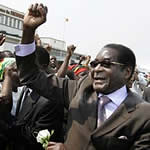
President Mugabe of Zimbabwe attended the African Union Peace and Security Council meeting held on March 10, 2011. Zimbabwe is launching a nationwide anti-sanctions campaign in this Southern African nation., a photo by Pan-African News Wire File Photos on Flickr.
President hails black farmers
Tuesday, 21 June 2011 01:00
Zimbabwe Herald
PRESIDENT Mugabe says Zimbabwe's economic recovery is partly attributable to the contribution of black farmers who have proven to be productive just like the white farmers they replaced following the land redistribution exercise, writes Farai Dzirutwe in Malaysia.
Cde Mugabe said new farmers had made a significant contribution towards this turnaround, as they were now the main players in the agriculture sector.
The President was explaining to curious Malaysian journalists how Zimbabwe managed to achieve an economic growth rate of over five percent last year against the background of the illegal sanctions imposed on the country by the West.
Cde Mugabe is part of the heads of state currently in Malaysia to attend the 9th Langkawi International Dialogue, which opened here at the weekend.
The Head of State and Government and Commander-in-Chief of the Zimbabwe Defence Forces said emphasis had been placed on the production of the main crops needed for food as well as cash crops such as tobacco, which is one of the country's major foreign currency earners.
The remarkable performance of the black farmers even under the challenges posed by the sanctions, had dispelled the perception that black people were not as productive as the white former commercial farmers.
"They are the main players in the agriculture programme. That means whether big or small, we are as productive as them (white farmers)," said Cde Mugabe.
He dismissed as fallacious and nonsensical, claims in some media quarters that people who had been allocated farms under the land reform programme were predominantly his friends and relatives.
"How can we have only Mugabe's friends and relatives getting land? My friends are my people and those are the people who fought with us to drive out the British. Anyway, the land belongs to the people. In various areas, we have a customary system where chiefs are the custodians of land on behalf of the people but we have maintained that all land is State land."
Cde Mugabe said another sector that had also contributed to economic growth was mining, where revenue from the relatively new diamond mines had come in handy.
The country, he said, was estimated to have a quarter of the world's known diamond reserves, putting it in a strong position to further expand the industry.
It was hoped that the country would continue to discover more minerals for it to be able to break the shackles of the sanctions affecting the welfare of ordinary Zimbabwe contrary to preposterous claims by Britain and her allies that they were only hurting targeted people in Government.
"Thank God . . . this shows the British that we have other minerals like diamonds, platinum and uranium. Perhaps we will continue to discover more and this will help in our efforts to grow the economy."
The President, however, regretted the decline of the manufacturing sector, saying efforts were being made to arrest the de-industrialisation that was blighting the economy.
Another priority area was the need to add value to primary products as this would lead to increased job opportunities as well as export revenues.
Cde Mugabe chided the West for continuously seeking to undermine development efforts in Zimbabwe and other African countries citing the case of Libya as yet another recent example.
"You can see what is happening in North Africa and North Africa is not happy at all with all those attacks," he said.
Meanwhile Deputy Prime Minister Professor Arthur Mutambara has described Zimbabwe's land reform programme as imperative and successful.
He said focus should now shift to optimum land use to ensure the success of the country's poverty reduction strategy.
Presenting a paper on poverty eradication during a panel discussion at the ongoing Langkawi International Dialogue, Prof Mutambara told delegates that the land redistribution exercise was part of the Government's broader economic empowerment drive targeting previously disadvantaged groups.
Now that the first phase of the programme, which involved land acquisition and redistribution, had largely been successful, the time was ripe to focus on production. This, he said, would lead to sustainable economic growth eventually leading to poverty reduction.
"In Zimbabwe, we have initiated a process to eradicate poverty by promoting the empowerment of disadvantaged groups through availing the means of production one of which is land. After the redistribution of land, the spotlight should now fall on optimum land use to ensure that there is high production," he said.
DPM Mutambara said a growth rate of at least 10 percent every year would see developing countries overcoming poverty and transforming themselves into medium income economies in 30 years. In the case of Zimbabwe, whose GDP currently stood at around US$12,5 billion, it was possible to create a US$100 billion economy by the year 2040 if the annual economic growth rate was to average 10 percent until that targeted year.
He said it was difficult for individual developing countries to fight poverty on their own, particularly in the context of the globalising world, adding that regional and even continental strategies should be formulated to tackle the problem. "We have heard visions from Zambia, Kenya and Lesotho on how these countries intend to tackle poverty but I am of the view that we should fight to eradicate poverty as regional blocs such as Sadc or even as continental blocs such as the African Union instead of trying to do it as individual nations. This should be the new survival paradigm," said Prof Mutambara.
No comments:
Post a Comment